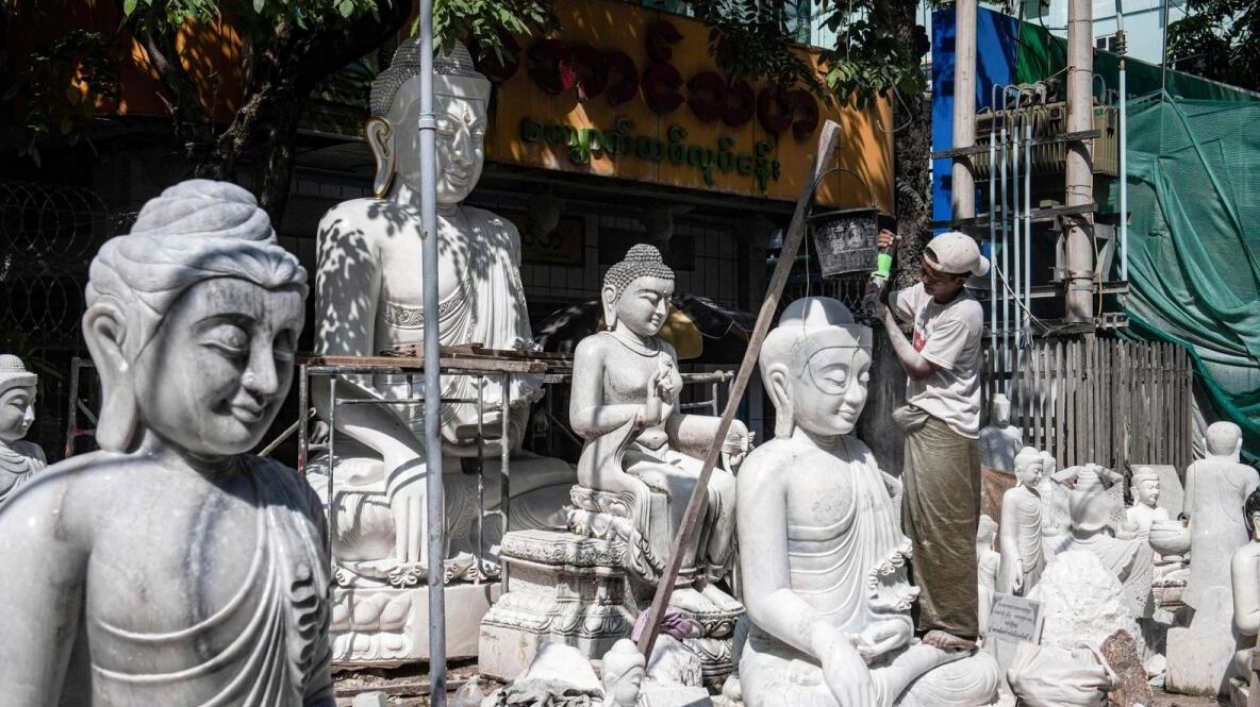A worker meticulously carving a marble Buddha statue in Mandalay. – AFP
Sculptor Aung Naing Lin has dedicated decades to crafting Buddha statues, aiding Myanmar's faithful. However, procuring the necessary marble from quarries under rebel control amidst the ongoing civil war has become an increasingly hazardous endeavor. Myanmar, predominantly Buddhist, has been engulfed in violent conflict since the military ousted Aung San Suu Kyi's government in 2021, ending a decade-long democratic experiment and igniting widespread armed resistance.
In recent months, anti-military factions have launched rocket and drone assaults on Mandalay, the nation's second-largest city with a population of 1.5 million. These rebels have also seized the hillside quarries that have supplied marble for Mandalay's palaces, monasteries, and household shrines for generations. Transporting this precious stone and partially carved statues by truck across the war-torn landscape from rebel to junta-controlled areas is now fraught with expense, difficulty, and danger.
"The conditions around Madaya township, where the quarries are, are quite dire," Aung Naing Lin confided to AFP in his bustling Mandalay workshop, his face and hair dusted with white marble particles. "It's not easy to access, and we can't bring the stones back." Surrounded by numerous faceless Buddha statues awaiting detailing, Min Min Soe concurred. "Sales aren't terrible, but the real issue is getting the statues here. We can only sell what we already have; we can't bring in new, raw statues."
The owner of another workshop, who wished to remain anonymous, revealed that associates were recently arrested while transporting marble from rebel-held Madaya. "They were detained by a local military unit and questioned about how they extracted the stones from the village, as that area is under PDF control," they explained. The "People's Defence Forces" comprise former students, farmers, and workers who have abandoned their previous lives to oppose the junta.
There are numerous PDFs across the country, and their actions have led to a bloody stalemate with the junta, which has labeled them "terrorists." Engaging with them can result in lengthy prison sentences. "Later, they released those detained and returned the stones," the workshop owner recounted. "It felt like a warning to all. Under these circumstances, we dare not bring stones from the village."
The Madaya quarries are deeply intertwined with Myanmar's cultural and religious heritage. In the 1860s, following two devastating wars with Britain, King Mindon commissioned Mandalay craftsmen to transcribe Buddhist scriptures onto 720 blocks of solid marble to safeguard them from further destruction. This stone also holds significance for the military, which has governed Myanmar for much of its post-independence history.
In 2020, the military sanctioned the construction of a 25-meter (82-foot) Buddha statue made from Madaya marble for their custom-built capital, Naypyidaw. Junta leader Min Aung Hlaing declared the statue complete last year, and it has since become a staple for the few foreign delegations visiting the isolated junta.
As conflict rages north of Mandalay, Min Min Soe and others continue to finalize the numerous roughly carved statues. While their forefathers used chisels, modern craftsmen employ drills to meticulously detail Buddha's face, robes, fingernails, and the lotus flower he sits upon. The laborious task of smoothing rough edges is performed by women using sandpaper, according to Min Min Soe.
"Women excel at this due to their patience," he noted. A finished statue, approximately 25 centimeters (10 inches) tall, typically sells for between 100,000 - 200,000 Myanmar kyat ($50-$100 at the official exchange rate). Outside one workshop on a bustling street, workers carefully packed a seated Buddha statue into a wooden frame for shipment to a customer.
Min Min Soe finds solace in tending to his numerous in-stock creations amidst rumors of an impending attack on Mandalay. He views them as "living Buddhas." "I clean the statues at 4 am daily... This is not just for business but to accrue merit," he explained. "I want them to be pristine and presentable, whether they are sold or not."
Source link: https://www.khaleejtimes.com






